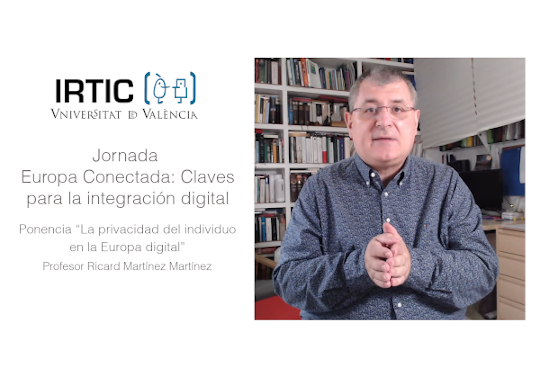
Speech by the director of the Càtedra, Ricard Martínez, at the Connected Europe conference: Keys to digital integration.
The Privacy and Digital Transformation Chair Microsoft-Universitat de València participated in the conference Connected Europe: Keys to Digital Integration organised by the Institute on Robotics and Information and Communications Technologies (IRTIC) of the Universitat de València, held on Thursday September 22nd, 2022.
The Chair was represented by its director, professor Ricard Martínez M., who presented the lecture The privacy of the individual in digital Europe.
A first point he raised was the European Union's strategy for competitiveness in the global market through the capacities for research, innovation and entrepreneurship - both public and private - in the field of digital transformation.
However, the academic pointed out that the governance of this transformation process is inspired by two pillars: ethics and law. He added that in relation to data analytics and artificial intelligence, "the guarantee of fundamental rights is the keystone that supports the regulatory structure that is built around them".
With regard to the legal tools that any entrepreneurship must have at European level, whether public or private, first and foremost is the General Data Protection Regulation (GDPR). In fact, in the case of projects that make use of data analytics, it is particularly relevant that they are accompanied by a risk analysis on the impact on the rights of individuals and data security.
Along with this, it is necessary to incorporate what ENISA has called privacy engineering. "It is a structure that guarantees, in all phases of design, compliance with the rights of individuals, data protection regulations and any other additional regulations that have an impact on the processing of data”, Martínez added.
However, there is a developing regulatory framework that will involve precise methodologies for process management and verification of risk and compliance. In fact, when designing a European project, it is necessary to consider regulations in the pipeline such as the Data Governance Act -which starts to be implemented this year-, the Data Act, the proposed European Health Data Space Regulation and the future Artificial Intelligence Regulation.
In short, "European projects must address a work package that integrates regulatory compliance with the design of the security of the data environment and, finally, with the ethics of the same", concluded the academic.
Lecture
Ponencia en jornada Europa Conectada: Claves para la integración digital from Catedra de Privacidad on Vimeo.








